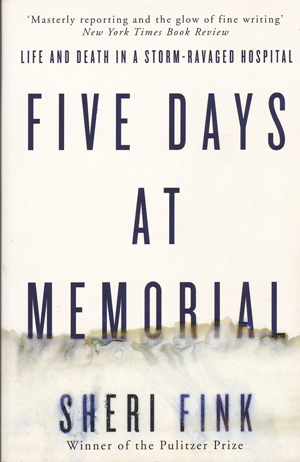Five Days at Memorial by Sheri Fink, Atlantic Books. Reviewed by Robin Osborne
Medico-turned-reporter Sheri Fink won the Pulitzer Prize for her first book, War Hospital: A True Story of Surgery and Survival, about the actions of medical professionals under siege during the genocide in Srebenica.
This exceptional follow-up has received equally high praise, although the focus is not a world away but down to New Orleans where Hurricane Katrina wreaked havoc on the famed city in August 2005, impacting particularly on its poorest residents.
The result, sub-titled ‘Life and death in a storm-ravaged hospital’, draws on more than 500 interviews with those who experienced the crisis in Memorial Medical Center, a major facility that continued functioning even when the power failed after floodwaters filled its basement. Only then were staff and patients evacuated by rooftop helicopters.
“The narrative was also informed by weather reports, architectural floor plans, electrical diagrams, and reports prepared by plaintiff and defense experts in the course of civil litigation,” Dr Fink explains.
The author’s writing skill translates her research into a work of great immediacy – “There had been drinking. A fight. The woman’s daughter stabbed her in the chest with a kitchen knife… The ICU nurses on the overnight shift received their new patient at about six a.m. and began positioning the tangle of equipment that had taken over for many of her bodily systems…”
The cast has names, backgrounds, and strong feelings about the chaotic situation, not least on how government bodies let New Orleans down, an example that President G W Bush would follow.
The legal dimension, which comes to dominate this 550-page investigative masterwork, focuses on the authorities’ determination to prosecute those clinicians whose end-of-life care for the most critically ill allegedly took the form of lethal injection.
For example, allegations that Dr Anna Pou had gone up to the seventh floor of Memorial “to end the lives of the nine surviving patients”, two witnesses claiming she “had told them directly that ‘lethal’ was her intention.”
On top of the hell of Katrina and an imploding hospital came the legal nightmare, farcical if not so malign: “The arrest teams had printed out Yahoo! maps on Friday and checked their targets’ work schedules… pairs of agents began watching Anna Pou, Lori Budo and Cheri Landry in four-hour shifts, following them between their homes and worksites.
“They were instructed to ‘maintain visual’ and know the women’s whereabouts at all times in preparation for the planned arrests of all three women on Monday.”
As Dr Fink was starting her research, the New Orleans coroner announced “no evidence of homicide” in the Memorial cases, and in July 2007 a grand jury declined to indict Dr Pou on ten counts of second-degree murder. Her defence had cost half-a-million dollars, ultimately covered by the state of Louisiana.
Notes the author, “Sometimes individual medical choices, like triage choices, are less a question of science than they are of values. In a disaster, triage is about deciding what the goals of dividing resources should be for the larger population – whether maximising number of lives saved, years of lives saved, quality of life, fairness, social trust, or other factors.”
While seemingly complex, the lessons learned may be summarised as the need for proper preparedness, a quality sadly lacking in many settings vulnerable to nature’s wrath and the inadequacy of systems and their creators.





